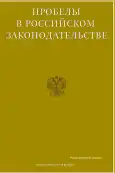Digitalization of Justice: Problems and Ways of Their Solution
- Авторлар: Apushkina T.S.1, Ginzburg I.V.2, Mitroshkina E.P.1
-
Мекемелер:
- Leninskiy regional Court of Saransk
- Ogarev Mordovia State University
- Шығарылым: Том 15, № 6 (2022)
- Беттер: 245-251
- Бөлім: Articles
- URL: https://bakhtiniada.ru/2072-3164/article/view/147742
- ID: 147742
Дәйексөз келтіру
Аннотация
Толық мәтін
##article.viewOnOriginalSite##Авторлар туралы
Tatiana Apushkina
Leninskiy regional Court of Saransk
Email: tatyana.apa@mail.ru
Court session secretary Saransk, Rupublic of Mordovia, Russia
Irina Ginzburg
Ogarev Mordovia State University
Email: irinag88@list.ru
Cand.Sci.(Law), Associate Professor of Civil Law and Process Department Saransk, Rupublic of Mordovia, Russia
Ekaterina Mitroshkina
Leninskiy regional Court of Saransk
Email: leninsky.mor@sudrf.ru
Judge, Leninskiy regional Court of Saransk Saransk, Rupublic of Mordovia, Russia
Әдебиет тізімі
- Federal Law No. 440-FZ of December 30, 2021 “On Amendments to Certain Legislative Acts of the Russian Federation” // Collected. legislation Ros. Federation. 2022. No. 1 (Part I). Art. 9.
- Decree of the Government of the Russian Federation of November 20, 2001 No. 805 “On the federal target program “Development of the Russian Judicial System” for 2002-2006” // Collected. legislation Ros. Federation. 2001. No. 49. Art. 4623.
- Decree of the Government of the Russian Federation of September 21, 2006 No. 583 “On the federal target program “Development of the Russian Judicial System” for 2007-2012” // Collected. legislation Ros. Federation. 2006. No. 41. Art. 4248.
- Decree of the Government of the Russian Federation of December 27, 2012 No. 1406 “On the federal target program “Development of the Russian judicial system for 2013-2024” // Collection of articles. legislation Ros. Federation. 2013. No. 1. Art. 13.
- Order of the Judicial Department under the Supreme Court of the Russian Federation of November 26, 2015 No. 362 “On approval of the List of basic concepts and terms used in the regulatory legal acts of the Judicial Department regulating the use of information and telecommunication technologies in the activities of courts, departments of the Judicial Department in the constituent entities of the Russian Federation and institutions of the Judicial Department” // Bulletin of acts on the judicial system. 2016. No. 2.
- Decree of the Presidium of the Supreme Court of the Russian Federation, the Presidium of the Council of Judges of the Russian Federation of April 29, 2020 No. 822 “On Amending the Resolution of the Presidium of the Supreme Court of the Russian Federation, the Presidium of the Council of Judges of the Russian Federation of April 8, 2020 No. 821” [Electronic resource]. Access from the reference-legal system "ConsultantPlus".
- Biard, A., Hoevenaars, J., Kramer, X., Themeli, E. Introduction: The Future of Access to Justice - Beyond Science Fiction. In: Kramer, X., Biard, A., Hoevenaars, J., Themeli, E. (eds) New Pathways to Civil Justice in Europe [Электронный ресурс]. URL.: https://link.springer.com/chapter/10.1007/978-3-030-66637-8_1 (дата обращения: 14.09.2022).
- De Vocht D. L. F. Trials by video link after the pandemic: the pros and cons of the expansion of virtual justice [Электронный ресурс]. URL.: https://doi.org/10.1007/s12689-022-00095-9 (дата обращения: 14.09.2022).
- Litigation & Dispute Resolution Laws and Regulations Netherlands 2022 [Электронный ресурс]. URL.: https://iclg.com/practice-areas/litigation-and-dispute-resolution-laws-and-regulations/netherlands (дата обращения: 12.09.2022)
- Litigation & Dispute Resolution Laws and Regulations Belgium 2022 [Электронный ресурс]. URL.: https://iclg.com/practice-areas/litigation-and-dispute-resolution-laws-and-regulations/belgium (дата обращения: 12.09.2022).
- Lupo, G. Assessing e-Justice Smartness: A New Framework for e-Justice Evaluation Through Public Values. In: Rodriguez Bolivar, M. (eds) Setting Foundations for the Creation of Public Value in Smart Cities. Public Administration and Information Technology, vol 35. [Электронный ресурс]. URL.: https://doi.org/10.1007/978-3-319-98953-2_4 (дата обращения: 10.09.2022).
- Mario Franzosi. Litigation & Dispute Resolution Laws and Regulations Italy 2022 [Электронный ресурс].URL.: https://iclg.com/practice-areas/litigation-and-dispute-resolution-laws-and-regulations/italy (дата обращения: 12.09.2022).
- Spesivov N.V., Titov A.A. The COVID-19 pandemic as a factor in the “forced digitalization” of Russian criminal justice // Bulletin of the Saratov State Law Academy. 2020. No. 3 (134). pp. 193-200.
- Russian Agency for Legal and Judicial Information (RAPSI) [Electronic resource]. URL: https://rapsinews.ru/judicial_analyst/20210105/306631763.html (date of access: 09/12/2022).
Қосымша файлдар








